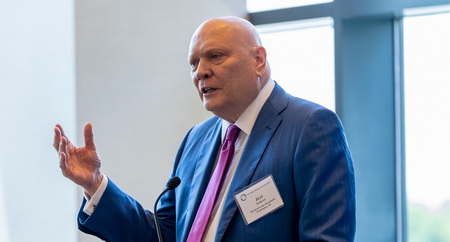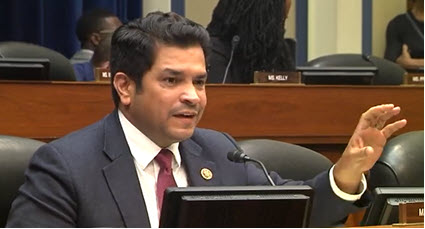
White House Chief of Staff Jeff Zients, above, directed Cabinet officials on Aug. 4 to increase the return of federal employees to their offices this fall as a “critical” part of fulfilling the mission of government agencies. The Real Estate Roundtable has urged President Biden and national policymakers for months to end government policies that encourage remote working arrangements for federal employees. (Government Executive, Aug. 7 | Axios, Aug. 4 | RER letter to President Biden, Dec. 12, 2022)
Back-to-Office Fed Policies
Roundtable Weighs In 
In a similar letter to President Biden in December, DeBoer noted that federal telework policies were ignoring “the negative impacts of remote work on cities and communities, labor productivity, and U.S. economic competitiveness, as well as the quality of government services.” (Commercial Observer, April 14 and RER letter to President Biden, Dec. 12)
# # #

Rep. Jimmy Gomez (D-CA), above, and nine other House Democrats last week urged federal banking regulators to incentivize conversions of commercial real estate to other uses. Rep. Gomez previously introduced the Roundtable-supported Revitalizing Downtowns Act (H.R. 4759) in 2021 to encourage adaptive use of older buildings. Sen. Debbie Stabenow (D-MI) also introduced companion legislation in the Senate (S. 2511). (Rep. Gomez news release, July 31)
Federal Regulators & CRE Conversions
Legislation & Tax Credits

White House Initiative 
New CRE Conversion Study
A property conversions working group created by The Real Estate Roundtable’s Tax Policy Advisory Committee will continue to respond to legislative proposals affecting potential property conversion activities.
# # #
 The Biden administration issued two new rules this week impacting real estate construction and investments in clean energy projects.
The Biden administration issued two new rules this week impacting real estate construction and investments in clean energy projects.

The Roundtable submitted comments in June when the IRS proposed the “bonus credit” program. (Roundtable Weekly, June 30). It will update its summary of IRA-related agency guidance following analysis of the newly issued rule.
# # #

The Real Estate Roundtable has released its FY2023 Annual Report, which coincides with the June 30 conclusion of the organization's fiscal year. The report details how the industry experienced significant transformation due to the global pandemic—yet emerged resilient and adaptive, achieving successes over the past 12 months on several national issues in the tax, energy, and capital formation policy areas.
Roundtable Policy Issues
# # #